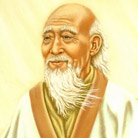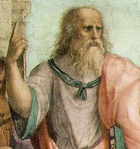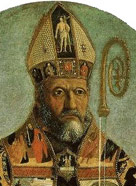Philosophers & Representative Quotes - Page 1/3
NOTE: A prelude to this list-of-philosophers is posted here » Centuries of Philosophical Thought, which details where the list came from.
 Lao Tzu (600-470 BCE, China) »
Lao Tzu (600-470 BCE, China) » To know what you do not know is best. To pretend to know what you do not know is a disease.
Father of Taoism. Author of the Tao-Te Ching (The Way of Virtue), world's most translated book after the Bible. Name means Old Master. Historians debate the exact dates he lived. His work has been embraced throughout history by various anti-authoritarian movements.
Because Lao Tzu lived so long ago, historical accounts have become legend. Tradition has it he grew weary of moral decay in the city and rode a water buffalo to unsettled lands to live as a hermit. A sentry standing guard at the city's gate recognized the old man and asked him to record his wisdom. This is the legendary origin of the Tao-Te Ching. Buddha (560-480 BCE, India, now Nepal) »
Buddha (560-480 BCE, India, now Nepal) » Look not for refuge to anyone beside yourself. Heed fast to the truth as a lamp.
Named Siddhartha Gautama. The word Buddha means Enlightened One or Awakened One. There are between 250 and 500 million Buddhists today. Buddhism consists of the Four Noble Truths and the Eightfold Path.
Buddha's teachings focus on how to avoid suffering, which he saw as a result of craving worldly pleasures. Suffering ends when this craving ends. Those who free themselves from such deluded desires reach a state of enlightenment known as Nirvana.- Siddhartha decided to sit under a fig tree for long as it would take to understand the problem of suffering. He sat there many days, in meditation, opening himself to the truth. On the full moon of May, with the morning star rising, he finally understood the answer to the question of suffering. That is where Siddhartha became the Buddha.
 Confucius (551-479 BCE, China) »
Confucius (551-479 BCE, China) » Wisdom, humanity & courage, these three are universal virtues. The way by which they are practiced are one.
Confucious was a social philosopher whose teachings emphasized person morality (ethics). Study and learning were important to him. He wanted his disciples to think for themselves.
His father was a famous warrior who died when Confucius was 3. His mother was a concubine with whom he lived in poverty after his father's death. He married at 20, but left his family to strive for his ideals. Socrates (470-399 BCE, Greece) »
Socrates (470-399 BCE, Greece) » The unexamined life is not worth living.
Founder of Western philosophy. Known as the gadfly. Never wrote anything himself. Most of what we know about Socates came from the writings of his star pupil: Plato. Socrates was found guilty of corrupting the minds of Athenian youth and sentenced to death .. by drinking hemlock (a poison).
Socrates' method of philosophical inquiry consisted in questioning people on the positions they asserted and working them through questions into a contradiction, thus proving to them that their original assertion was wrong. Socrates himself never takes a position. In Plato's The Apology Socrates claims to know nothing except that he knows nothing.
Plato refers to this method of questioning as elenchus, which means something like "cross-examination." The Socratic elenchus gave rise to dialectic, the idea that truth needs to be pursued by modifying one's position through questioning and conflict with opposing ideas. Plato (427-348 BCE, Greece) »
Plato (427-348 BCE, Greece) » The feeling of wonder is the touchstone of the philosopher and all philosophy has its origin in wonder.
Plato founded the Academy in Athens, the first institution of higher learning in Western civilization. Mentored by Socrates. Deeply affected by his teacher's unjust death. Mentored Aristotle. Aristotle (384-322 BCE, Greece) »
Aristotle (384-322 BCE, Greece) » It is the mark of an educated mind to be able to entertain a thought without accepting it.
Mentored by Plato. Teacher of Alexander the Great. Founder of formal logic. Most of his writings have been lost. Only ~ a third survived. St. Augustine (354-430, Algeria, North Africa) »
St. Augustine (354-430, Algeria, North Africa) » Just as it is agreed that we all wish to be happy, so it is that we all wish to be wise, since no one without wisdom is happy.
Born to pagan father and Catholic mother. Resisted his mother's pleas to become Christian. He later converted to Christianity and became a bishop. Wrote a book titled » City of God. Lived a hedonistic lifestyle as a youth. Bragged about his experiences with the opposite sex. Uttered the famous prayer, "Grant me chastity and continence, but not yet."
Next Page » Philosophers & Representative Quotes, Page.02